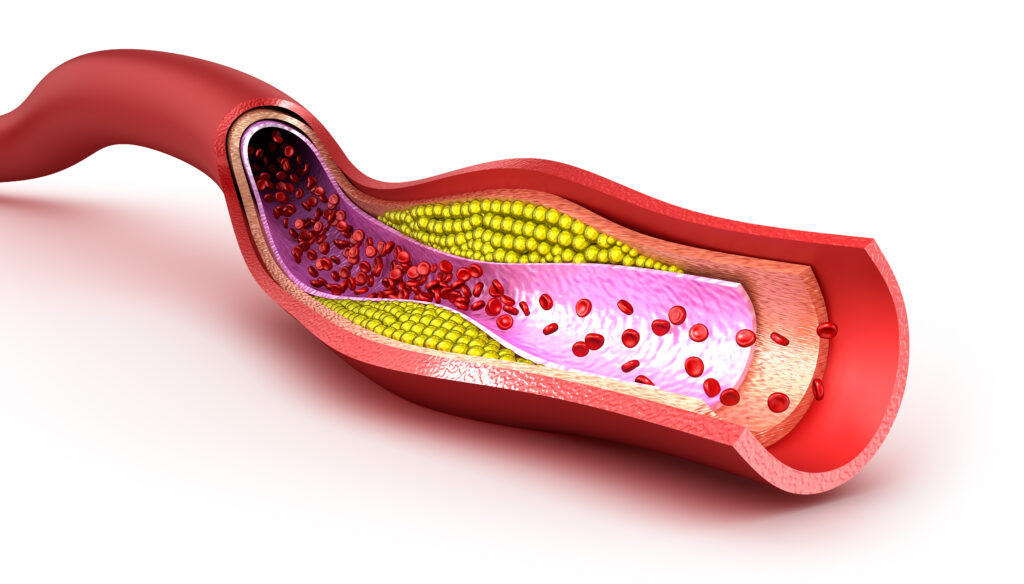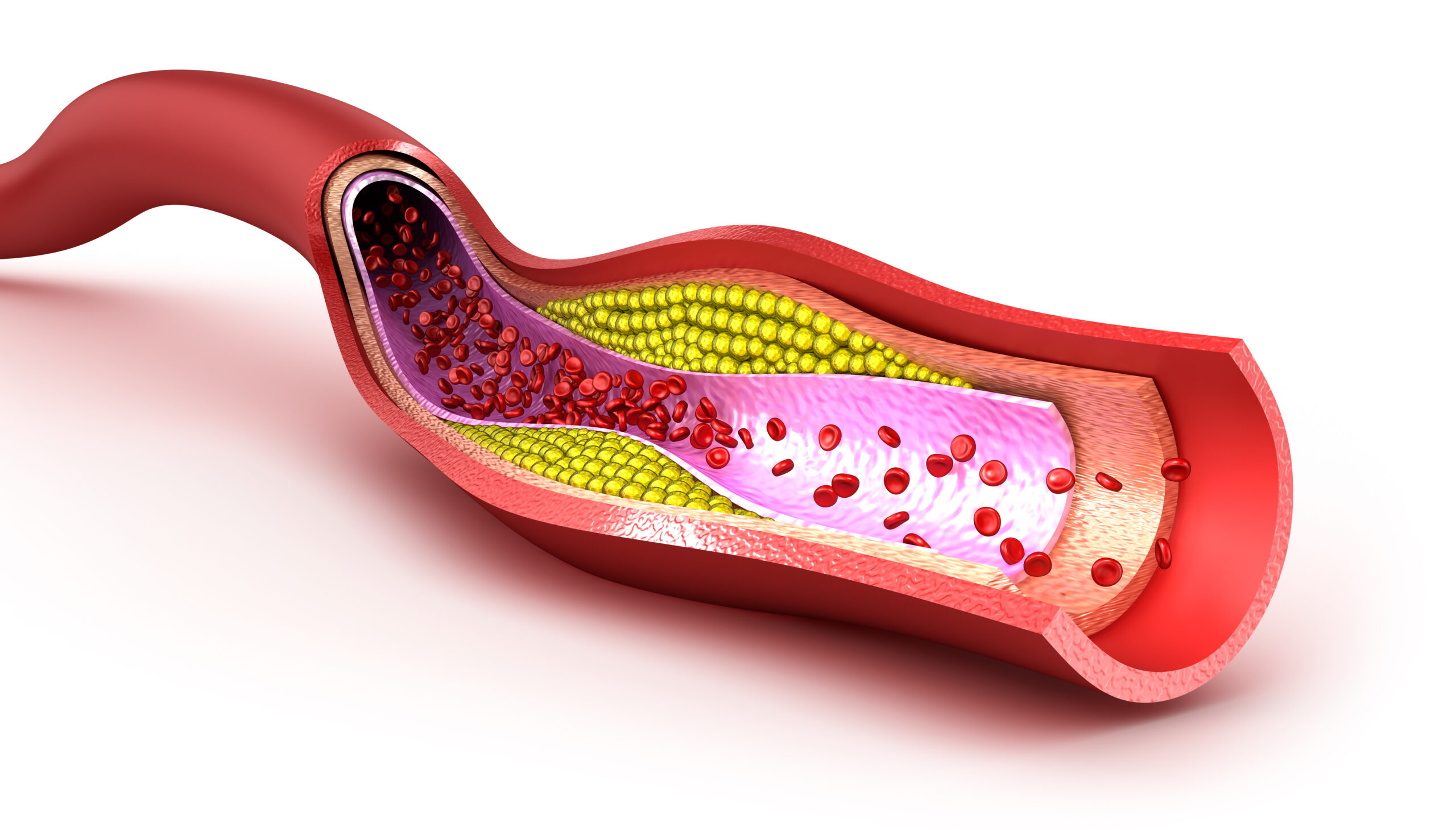Are you concerned about your cholesterol levels or do you have high cholesterol in your family? If so, you may wonder if your cholesterol levels truly affect your risk of heart problems, such as a heart attack.
Does high cholesterol cause heart attacks, and how much cholesterol per day is safe to have to reduce your risk? As a cardiac dietitian, I’m here to bring you the latest facts on cholesterol levels and your heart health.
Let’s unpack the link between cholesterol and heart attacks. What cholesterol levels are concerning? What are the recommended daily cholesterol intake recommendations to keep your heart in tip-top shape?
What Is Cholesterol?

Cholesterol is a waxy, fat-like substance made by your liver. It is a type of lipid, a fatty compound that serves many functions in the body. It is found in all cells of the body, especially the brain and spinal cord.
Even though too much cholesterol is bad for your health, it serves many important functions in the body. It plays a role in steroid and sex hormone production, cell membrane structure, vitamin D synthesis, and fat digestion and absorption.
And while we do need some cholesterol for health, having too much can increase the risk of a heart attack.
Does High Cholesterol Cause Heart Attacks?
High cholesterol levels in the blood are a direct risk factor for a heart attack. This is because it leads to the narrowing of the arteries over time.
This process begins with plaque formation (i.e. cholesterol build-up) in the arteries – an active process that starts with high LDL- cholesterol levels. When there is too much LDL in the blood that is not being cleared out, it starts to accumulate in the arteries. This causes them to become hardened and narrowed.
When combined with inflammation and oxidative stress, a cascade of further plaque growth, rupture, and artery narrowing occurs. If this continues to build, a complete artery blockage can occur – leading to a heart attack.
The key to preventing this sequence of events is controlling the blood levels of several markers such as LDL and non-HDL cholesterol, a protein called ApoB, and triglyceride levels.
Client Success Story
A 55-year-old woman came to see me because she had a CAC score of 144, indicating high levels of plaque in her coronary arteries. She was unsure why she had high plaque formation for her age given she was active and led a healthy lifestyle.
Our initial evaluation revealed she had several risk factors that needed to be addressed to improve her risk of cardiovascular complications. When someone has a high CAC score and/or genetic susceptibility to premature heart disease, it is important to take a more proactive approach to risk modification to improve heart health and longevity.
Some of the factors discovered during our initial 90-minute assessment were her high cholesterol (LDL 126mg/dL, non-HDL cholesterol 142mg/dL) and high blood pressure (130/90’s). Her BMI was considered healthy (23), however, she had an increased waist circumference (37 inches) indicating underlying inflammation.
She was also on a laundry list of supplements that were not beneficial for her heart.
We worked closely together in my 1 on 1 program and within 3 months, her LDL cholesterol decreased by 53 points to 73mg/dL, her non-HDL cholesterol dropped by 55mg/dL to 87mg/dL, her blood pressure decreased to an average of 120/75mmHg, and her waist circumference decreased by 3 inches (34 inches = optimal!)!
We focused on optimizing her blood values and risk profile by adding therapeutic heart-healthy foods to lower artery-clogging cholesterol, improve blood vessel health and blood pressure, and address waist circumference.
We also decreased most of the supplements she was taking, as they were not beneficial for her heart health (even though they may often seem harmless). After our work together, she felt more empowered in her food choices and less fearful of her future.
We address these parameters and more in my 6-week heart optimization group program.
Types Of Cholesterol
There are three main types of cholesterol in your blood, also known as lipoproteins. They are called lipoproteins because they are made up of protein and lipids (i.e. fats). The three types are known as HDL, non-HDL, and LDL.
HDL – Known as high-density lipoprotein, this is considered the “good” cholesterol. It is good because it is protective of your heart and helps remove the artery-clogging forms of cholesterol from your bloodstream.
LDL – Known as low-density lipoprotein, this is referred to as the “bad” cholesterol. It is more damaging because it leads to more plaque formation in the body.
There are several types of low-density lipoproteins such as very-low-density-liporoteins (VLDL) and intermediate-density lipoproteins (IDL) eventually transform into LDL.
Non-HDL – This type includes all of the artery-clogging lipoproteins combined – such as LDL, VLDL, and IDL. Non-HDL levels gives us insight into the level of plaque-forming cholesterol you have in your bloodstream. In a bloodwork report, this non-HDL number is your total cholesterol minus your HDL cholesterol level.
Risk Factors For High Cholesterol
There are several risk factors for high cholesterol levels, many of which you can control. Here are the most common:
Diet – A diet that is high in added sugar, saturated and trans fats, as well as sodium can increase the risk for inflammation and plaque buildup in arteries.
Lack of exercise – Living an overall sedentary lifestyle and a lack of physical activity is associated with higher LDL and lower HDL cholesterol levels.
Smoking – This habit both increases LDL and lowers HDL, increasing the risk of plaque buildup in your arteries over time.
Genetics – If you have high cholesterol in your family or genetic susceptibility, you are more likely to have high cholesterol levels. It’s important to remember that while you may be at an increased risk in this case, it’s not inevitable and it can be controlled.
Focusing on what you can control, such as learning how to follow a cardiac diet, can help you feel empowered to protect your heart health.
Heart Attack Cholesterol Levels In The Blood
When it comes to assessing your overall heart attack risk, it’s essential to get your cholesterol levels checked and to know what is considered a high level.
In addition to the core cholesterol levels already mentioned, there are other blood lipids and markers that should also be checked to understand your overall heart attack risk. These include triglycerides, ApoB, and CAC.
Here are the cardiac panel markers to get checked to get a complete picture of your cholesterol levels and heart attack risk:
- Non-HDL – In the general population, levels in the blood should be less than 130 mg/dL, or no more than 30 mg/dL higher than your ideal LDL cholesterol level (determined by your doctor). In someone with cardiovascular risk factors or at high risk of a cardiovascular event, this number should be less than 100mg/dL.
- HDL – Ideal levels are 60-80 mg/dL for men and women. Past recommendations for HDL were the higher the better, but new research shows an increased risk of cardiovascular disease and death if numbers are too high.
- LDL – In the general population, levels in the blood should be below 100 mg/dL. In those who have had previous cardiovascular events, a CAC score above 0, or increased risk of heart disease, LDL levels should be less than 70mg/dL.
- ApoB (Apolipoprotein B) – This is a sticky protein that is attached to the LDL that causes plaque to form in the arteries. It is not yet standard practice to test for this, but research shows it may be a more reliable marker of your vascular health. Ideal levels are below 80 mg/dL if you are low risk, and less than 50 mg/dL if you are at high risk.
- Triglycerides – This is another type of fat circulating in the body, which can also clog the arteries. Triglyceride levels should be less than 100mg/dL.
- CAC Score – Also known as a calcium score, this test measures the level of calcium deposits and therefore plaque in your arteries. Levels can range from 0-400 or more, and should be as close to 0 as possible, depending on your age, gender and ethnicity.
If you’re concerned about your heart health, ask your doctor to add these labs to your cardiac panel.
Daily Cholesterol Intake Recommendations For Heart Health
How much cholesterol per day is recommended in the diet for heart health? Traditionally, if your blood cholesterol levels were high, the top recommendation was to limit dietary cholesterol intake to 300 mg/day.
However, dietary cholesterol is no longer thought to be the primary driver of high blood cholesterol levels.
Several studies have not found a link between cholesterol intake in the diet and blood cholesterol levels. Due to this lack of evidence, the recommendation to limit cholesterol was removed from the 2015-2020 Dietary Guidelines for Americans.
Research shows that when a healthy individual eats dietary cholesterol, the liver will regulate how much cholesterol it needs to make and will stop producing more. Therefore, it does not cause an increase in dietary cholesterol.
Instead of focusing solely on cholesterol intake, it’s recommended to focus more on limiting the following for healthy cholesterol levels:
- Saturated fats – Butter, coconut oil, palm oil, red meat, and processed meat
- Trans fats – fried foods, margarine, baked goods, frozen pizza
- Added sugar – sweetened coffee creamers, juice, soda, energy drinks, flavored yogurt, granola bars, baked goods
- Sodium – cured meats, potato chips, pretzels, popcorn, canned goods, frozen dinners
While this may seem like a long list, there are also plenty of delicious foods to enjoy on a heart-healthy diet. In my Heart Optimization Group program, we put the emphasis on what to eat more of versus what to restrict to protect your heart and reduce your need for cholesterol-lowering medications.
Takeaway
If you have established heart disease or are simply taking a proactive approach, keeping your heart attack cholesterol levels in a healthy range can reduce your risk. Adopting a heart-healthy lifestyle through a cardiac diet, exercise, and stress management can effectively manage your levels and reduce your need for medications.
My 6-week Heart Optimization group program offers expert support and guidance on how to reduce your heart disease risk factors by improving your daily habits. And if you’re looking for a more personalized approach, schedule a complimentary discovery call to learn more about my 1:1 counseling program.
References
- Park JH, Joh HK, Lee GS, Je SJ, Cho SH, Kim SJ, Oh SW, Kwon HT. Association between Sedentary Time and Cardiovascular Risk Factors in Korean Adults. Korean J Fam Med. 2018 Jan;39(1):29-36. doi: 10.4082/kjfm.2018.39.1.29. Epub 2018 Jan 23. PMID: 29383209; PMCID: PMC5788843.
- Virani SS. Non-HDL cholesterol as a metric of good quality of care: opportunities and challenges. Tex Heart Inst J. 2011;38(2):160-2. PMID: 21494527; PMCID: PMC3066801.
- Liu C, Dhindsa D, Almuwaqqat Z, Sun YV, Quyyumi AA. Very High High-Density Lipoprotein Cholesterol Levels and Cardiovascular Mortality. Am J Cardiol. 2022 Mar 15;167:43-53. doi: 10.1016/j.amjcard.2021.11.041. Epub 2022 Jan 14. PMID: 35039162.
- Harper CR, Jacobson TA. Using apolipoprotein B to manage dyslipidemic patients: time for a change? Mayo Clin Proc. 2010 May;85(5):440-5. doi: 10.4065/mcp.2009.0517. PMID: 20435837; PMCID: PMC2861973.
- Shreya D, Zamora DI, Patel GS, Grossmann I, Rodriguez K, Soni M, Joshi PK, Patel SC, Sange I. Coronary Artery Calcium Score – A Reliable Indicator of Coronary Artery Disease? Cureus. 2021 Dec 3;13(12):e20149. doi: 10.7759/cureus.20149. PMID: 35003981; PMCID: PMC8723785.
- Soliman GA. Dietary Cholesterol and the Lack of Evidence in Cardiovascular Disease. Nutrients. 2018 Jun 16;10(6):780. doi: 10.3390/nu10060780. PMID: 29914176; PMCID: PMC6024687.
- Janapala US, Reddivari AKR. Low Cholesterol Diet. [Updated 2023 May 1]. In: StatPearls [Internet]. Treasure Island (FL): StatPearls Publishing; 2023 Jan-. Available from: https://www.ncbi.nlm.nih.gov/books/NBK551722/
